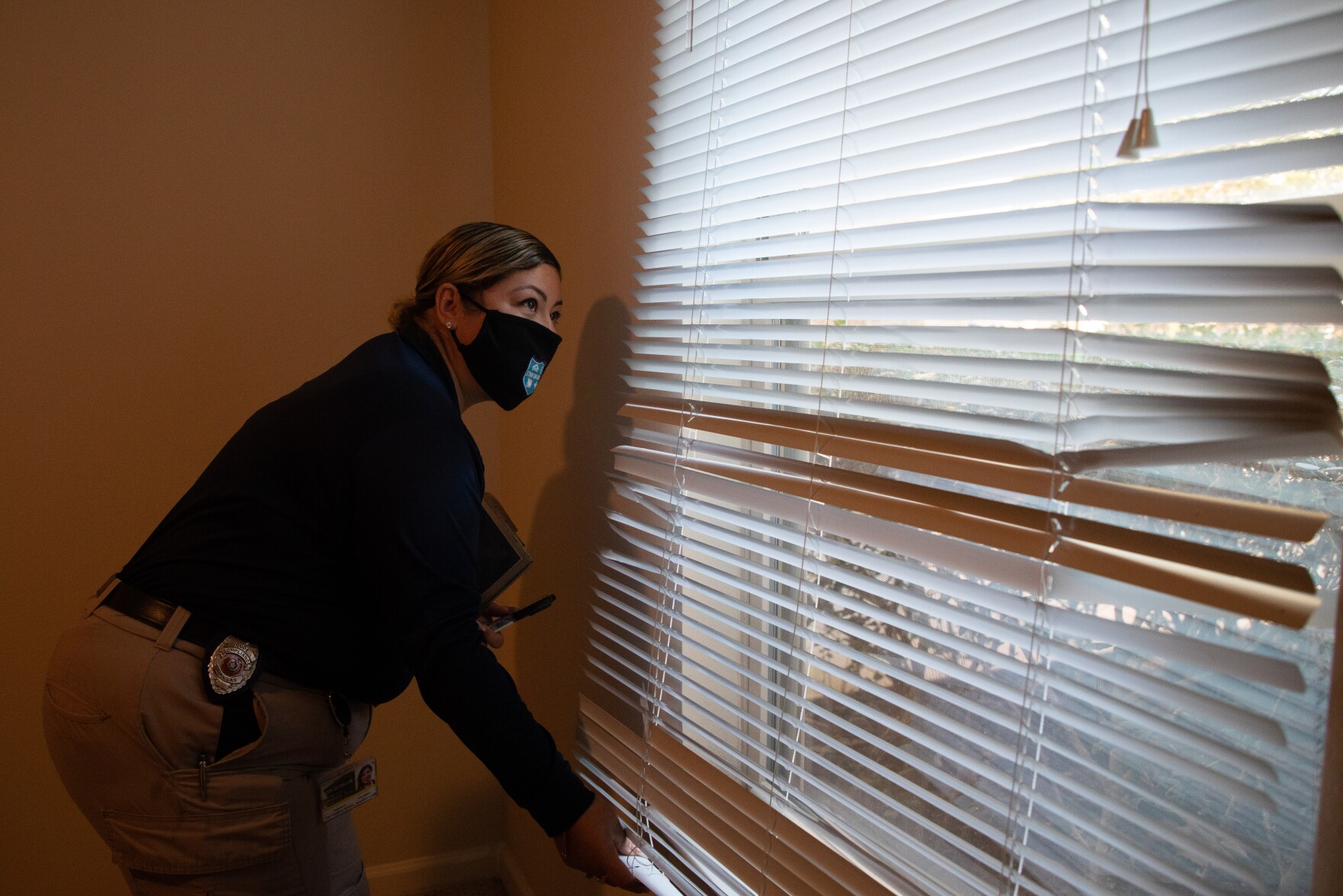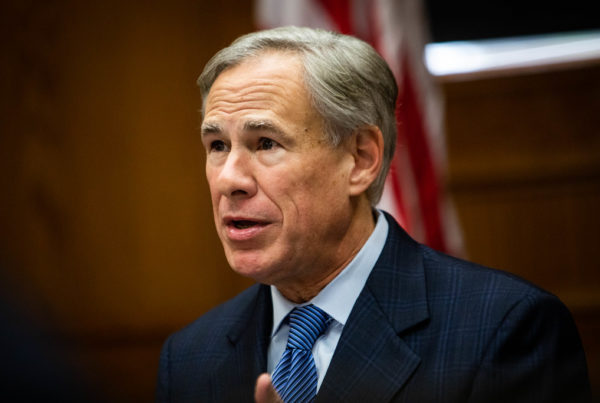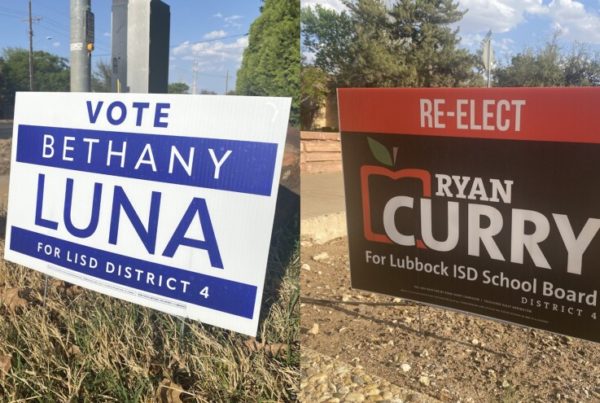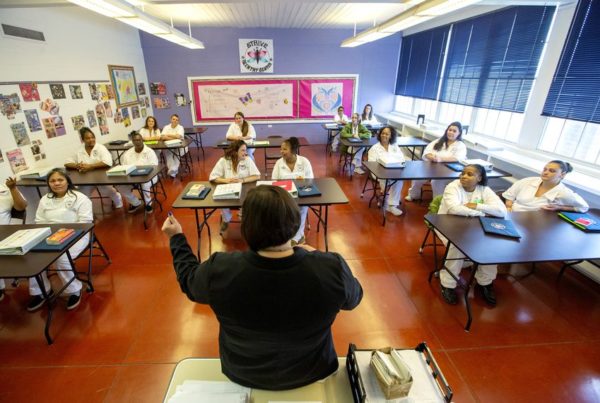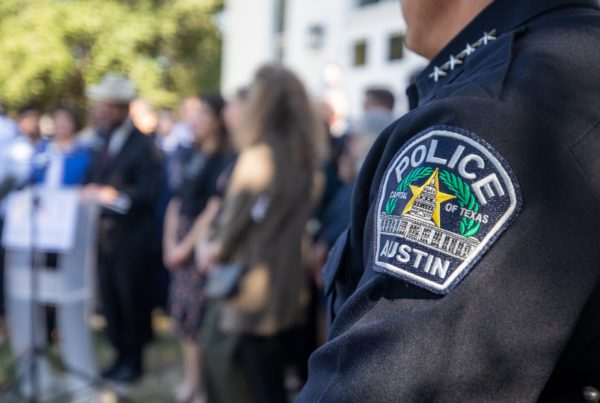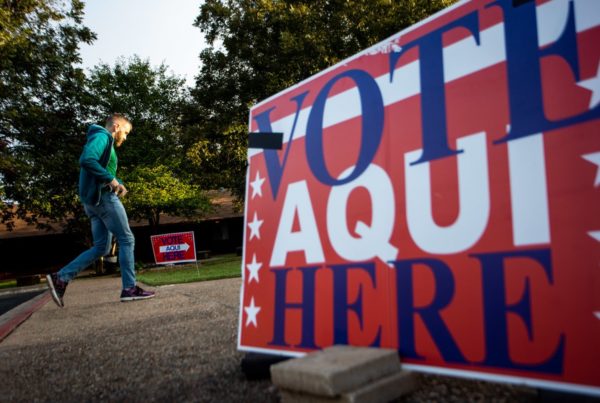“Sometimes when they look nice on the outside, it’s the inside that we want to get in,” the Dallas code inspector said as she checks off a list on her clipboard.
Del Toro says her job is to ensure that apartment complexes in Northeast Dallas are safe, clean and meet the city’s standards. As she climbed a ladder to make sure the smoke detector worked properly at a senior living facility recently, Del Toro said that in many ways the health and well-being of Dallasites falls into her hands.
Code inspectors in Dallas face a daunting task. Their job is to protect citizens from unsafe or unhealthy conditions. And fewer than two dozen are trained to focus on multi-tenant properties — in a city with tens of thousands of apartment units.
Other factors make apartment inspections difficult. Some tenants fear retaliation if they complain about conditions in their apartments. The city’s 311 system is hard to navigate. And for many months, interior code inspections stopped because of the COVID-19 pandemic.
What’s happened in Dallas is not unique. Tenant advocacy groups report that similar problems can be found in towns and cities across the state.
In “landlord-friendly” Texas, advocates say, it’s easy to evict tenants. And local governments often have a hard time getting landlords to make repairs. Much of the burden is placed on tenants to fight for adequate housing.
Fear and frustration
Even when a resident makes a complaint, Del Toro said it’s hard for code inspectors to respond quickly.
For example, residents can call 311 and complain about problems at their apartments. Often by the time the code inspector makes it to the property — perhaps a couple days later — the problem has been temporarily fixed. And Del Toro said that frustrates many residents.
“We’ll come one day and [something] is not working. Then the next day it is working,” Del Toro said. “It’s hard for us to do any kind of enforcement when we can’t provide proof that it’s not working.”
Del Toro said residents do not file complaints for many reasons.
Many don’t know who to call. Others don’t speak English.
In Vickery Meadow, for example, an ethnically-diverse neighborhood in Northeast Dallas, dozens of languages are spoken. Immigrants and refugees who call 311 may not reach someone who speaks their language. The city started hiring Spanish-speaking agents only recently, but other common languages in this neighborhood are Dari, Khmer, Burmese, French and Bosnian. The city said they contract with a translation service for 311 calls.
Refugees in Vickery Meadow told KERA that the lack of affordable housing is a big reason why they are afraid to speak out. There aren’t a lot of other housing options in Dallas and they’re afraid they’d have no place to go. And moving expenses can strain or even break a limited budget.
“That’s the reason a lot of people don’t want to talk about it. Even I get scared,” said Jonathon, a resident who lives at the Ivy Apartments in Vickery Meadow. “That’s the only thing my parents can afford.” (He asked that his real name not be used because he is worried about retaliation.)
KERA asked the company that owns the Ivy Apartments and another complex nearby to comment about tenants’ concerns about retaliation. An attorney for Nuran, Inc., did not respond to written questions in an email and did not sit down for an interview.
Del Toro said fear of retaliation is something she hears about as well from tenants in the city’s Northeast District. That includes Vickery Meadow.
“From what I’m told by the residents, that management threatens them and says they are going to call ICE [Immigration Customs and Enforcement]. That’s why they don’t complain,” Del Toro said. Residents also have told Del Toro that some apartment managers threaten to increase their rent if they complain.
Sometimes, when Del Toro uncovers a major problem, she finds out that the tenants “have been living with it for so many years because they’re too scared to complain to the city.”
Dallas City Code prohibits landlords from raising rent to retaliate against tenants who complain. It also doesn’t allow landlords to diminish services or attempt to evict a tenant “within six months after the tenant files a valid complaint.”
If tenants are retaliated against, they can file a complaint with the city. But Sandy Rollins, executive director of the Texas Tenants’ Union, said that it is a long and lengthy process, and most people don’t have the time to take on a “whole battle.”
Landlords “feel empowered to mistreat because they know how hard it is for tenants to hold them accountable,” Rollins said.
Current and former residents in Vickery Meadow said landlords may not care too much about the consequences if tenants chose to leave or are forced out. The supply of new tenants may seem almost inexhaustible as conflicts and poverty propel refugees and immigrants to the U.S. Thousands of recent refugees from Afghanistan are living in hotels as they await permanent housing, and the Ukraine crisis is already producing more refugees.
Pandemic changes inspections
Dallas apartments are supposed to be inspected once every three years.
But when the pandemic hit, interior inspections of occupied apartments came to a halt for about nine months, according to city officials. That made it hard to spot major health and safety code violations.
“We didn’t want to expose the residents nor expose our code officers to unnecessary contact, potentially contracting COVID, if it wasn’t absolutely necessary,” said Carl Simpson, director of the Dallas Department of Code Compliance Services.
Simpson’s department switched its operations to a complaint-driven system. That means, if a resident doesn’t complain, a code inspector is unlikely to learn about a problem. And the number of complaints appears to have declined significantly since the complaint-driven system was started.
“It’s kind of hard for us to get inside, especially when there’s no complaints,” Del Toro said.
The complaint-driven system also concentrated on major problems — such as a lack of hot water, air conditioning or heat, as well as electrical issues and water leaks.
“We really focused on those life safety issues, and those exterior issues related to apartment complexes, whether it be pools or whether it be balconies, things like that you can see from the outside,” Simpson said.
The code department has been experimenting with new ways to do inspections virtually with FaceTime or other video software. But Ariel Garcia, manager at the Department of Code Compliance’s Northeast District Division, said a code inspector’s job is best done in-person.
“A lot of jobs, you can find a way to transition to become virtual. You can’t do this virtually. We have to have boots on the ground to come and take care of these violations or catch problems before they become violations,” Garcia said.
Few inspectors
In a city with over 2,700 multi-tenant properties, which include apartments, there are only 20 city code inspectors who are “specifically train[ed] to address multi-tenant concerns and inspections,” according to a statement city officials provided to KERA.
The city estimates that the Vickery Meadow neighborhood alone has almost 12,000 individual apartment units. Four code inspectors with the specialized multi-tenant training are “dedicated to the Northeast District,” which includes Vickery Meadow.
And there’s a high demand for housing. About two-thirds of Dallas residents live in rental housing, and that can drive rental prices up.
“Every day we’re talking to people who are in substandard places, but they cannot afford to move,” Rollins said.
Rollins said landlords can get by supplying low-quality housing because of the dwindling stock of affordable housing. This creates a financial burden for families and limits where they can live.
About 1,869 apartment units were constructed and completed in Dallas during the first six months of 2020, according to the city. Such growth only adds to the burden on code inspectors. That burden is likely to increase even more when the city moves beyond the complaint-driven system that was created during the pandemic.
“If you notice downtown [Dallas] every crane you see, that’s a new apartment complex that’s going to be filled with tons of people. So, there’s a huge need for inspectors that know how to inspect apartment complexes,” Garcia said.
Garcia said that as the Dallas population grows, so should the number of inspectors.
This was a point of concern for the city council, which voted last year on a city budget that approved the hiring of an additional 31 code officers to augment the Neighborhood Code program, according to the department.
“The department is and will continuously seek talent interested in improving the quality of life for the community. All new hires are being trained to address code violations in residential and multi-family neighborhoods,” according to a statement from the code compliance services department.
The statement said code compliance services is looking at cross-training opportunities that “should allow for ample coverage. However, we will continue to evaluate our resources to ensure appropriate staffing.”
Tenant mobilization
In other Texas cities, the problems facing tenants may get even less attention.
“It’s something that can easily slide by without the city stepping in to step and active role and monitor these conditions,” said Heather K. Way, a professor at the University of Texas’ School of Law who’s studied code enforcement.
Way led a study about Houston apartments in 2018 that identified multiple systemic failures. The study documented delays in code response and enforcement, an insufficient 311 system, and reported that more than a fourth of apartment multi-family apartment complexes did not have an active certificate of occupancy — which allowed dangerous housing conditions to persist for years.
“Houston’s problems are unique that there’s just enormous amounts of dysfunction within city government and the fractured approach to code enforcement,” Way said.
Despite Dallas’ problems, Way said, it could be worse.
For example, Dallas has code inspectors specifically assigned only to monitor multi-family units. But Austin doesn’t have that kind of specialization, Way said. She also praised Dallas for being willing to take noncompliant apartment owners to court.
Way and other advocates suggested that in addition to more robust enforcement of code by local governments, tenants need to be more empowered.
The city of Austin has funded a tenant organizing group and outreach called Building and Strengthening Tenant Action (BASTA). Way said that kind of program doesn’t exist in any other part of the state and Dallas could benefit from one.
“Being able to have tenants sort of work together and speak out in numbers has been proven to work elsewhere,” Way said.
Rollins said tenants have limited options when they try to get problems fixed. They might try to terminate their lease and sue their landlord. They can repair the problem themselves and try to deduct the costs from their rent. Or, they can live with the problem.
But all too often, tenants are afraid to act.
“I would like there to be a system where the landlords are afraid to mistreat tenants instead of the tenants being afraid to hold their landlord accountable,” Rollins said. “And we’re just not there yet.”


